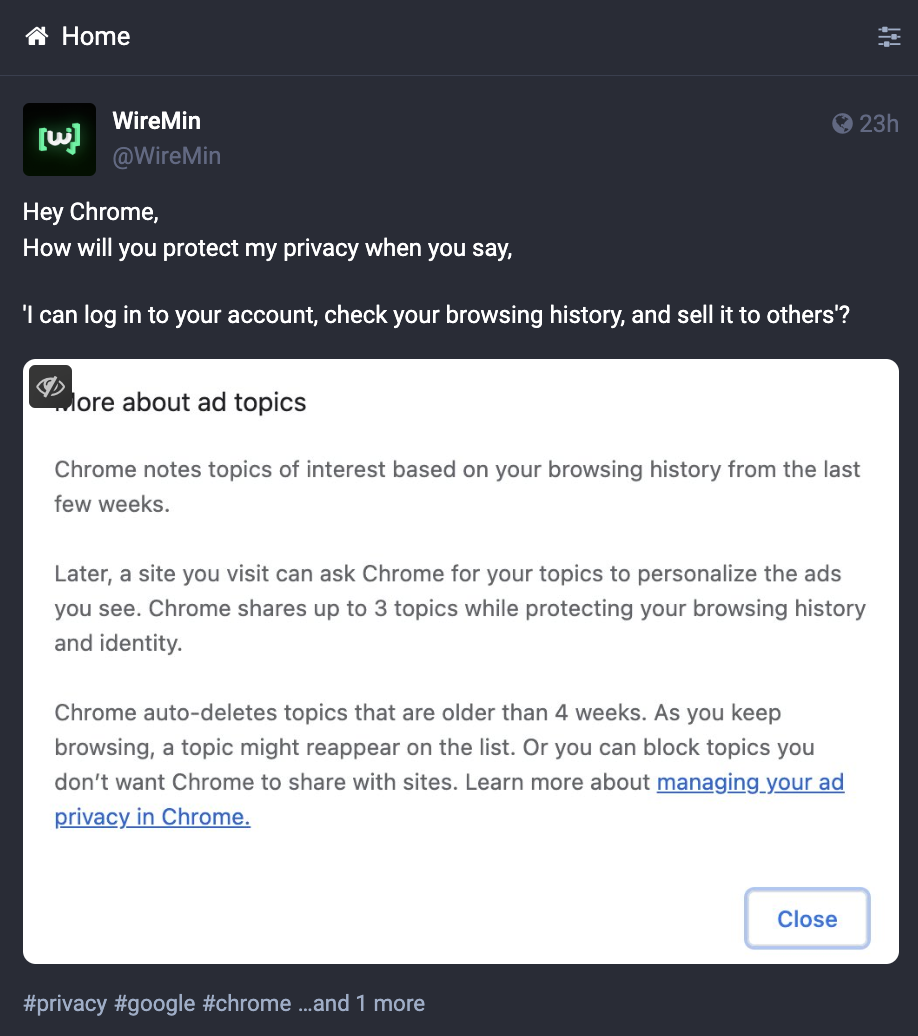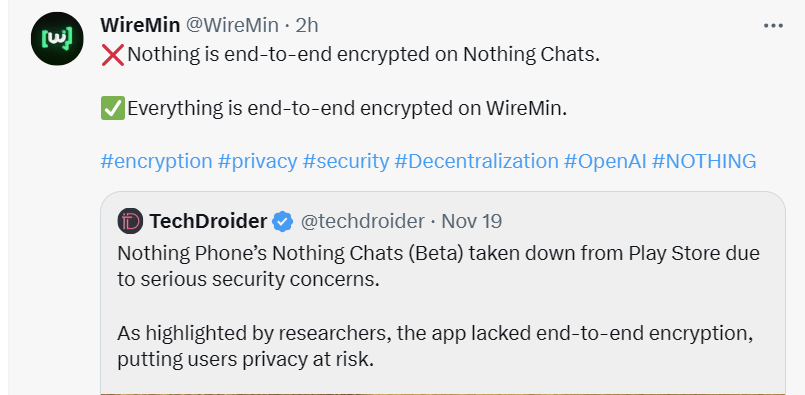It is not new.
Wothe
- 13 Posts
- 60 Comments

 11·8 months ago
11·8 months agoMan just taking a break and comes back with hire salary.

 75·8 months ago
75·8 months agoDitch centralized platforms.
TUCKER: “Media Matters is a censorship organization funded by George Soros and others who hate Western civilization designed to prohibit people from saying certain things.” And what they are prohibiting are the truth.
Manipulation can be stop by decentralization.

 21·8 months ago
21·8 months agoAn add on: WireMin, Session and SimpleX.

 21·8 months ago
21·8 months agoYep, decentralized is the key.

 11·8 months ago
11·8 months agoIt used to be a decentralized social app + a chat app. But now you can switch between them.

 26·10 months ago
26·10 months agoIts from X
Well you are here already, Lemmy is good. Others?
Mastodon, join instance in your interests.
Damus, I like it better before, its kinda full of spam now.
WireMin, its kind of different tho, it can be a private messenger, I like to join some chat rooms, you can talk anonymously there, and chat room owners can’t remove your message, of course you can post stuff on your own Feed like tweeting.
Monitoring
Spying
Banning
Ghosting
Subscription
Use my data to train AI
Keep going plz …

 4·10 months ago
4·10 months agoI guess…full of sh*t.

 1·10 months ago
1·10 months agodeleted by creator

 21·10 months ago
21·10 months agoA privacy focused social media? Cuz if ‘just a chat app’, SimpleX or Session probably meets more

 75·10 months ago
75·10 months agoFor some clarification:
You first need to understand the meaning of “dapp”: dapp stands for decentralized application.
“Decentralized” means there is no central server.
Central server: This is essentially a cloud storage that retains data. Major tech companies like Google, Twitter, and Facebook all have central servers where they store user data, such as chat histories, usernames, passwords, contact lists, and online activities. They might sell this data to advertisers. Platforms like Twitter might use it to train their AI models or refine algorithms to predict users’ interests, thereby keeping users engaged with their platforms or apps. Moreover, a centralized platform can be likened to a paradise for hackers, as they only need to breach one server to obtain a wealth of sensitive data. (I assume everybody knows cloud is just another computer.)
On the other hand, “decentralized”, as the term suggests, means there’s no central server. Consequently:
- Your data isn’t stored on a central server (someone else’s computer); you keep your own security.
- No one can moderate or remove your content, ensuring free speech and avoiding censorship.
- No entities, like Google for example, can access data such as your browsing history.
- Your account is less susceptible to hacks since there isn’t a singular server to target, unless of course, you share your password.
The reason a search for “dapp” often leads to results about cryptocurrencies is that networks like WireMin are decentralized. “Decentralized” in the current context often relates to web3. Today, when most people aim to learn about or enter the realm of web3, they’re introduced to concepts like cryptocurrency and NFTs.
However, to me, web3 signifies more than just the crypto world; it embodies the decentralized (or democratic) concept. Big tech companies represent the web2 era since they operate in a centralized and often monopolistic manner, influencing our perceptions by controlling media content. Personally, I find this concerning, which is why I’m gradually transitioning to decentralized networks like WireMin and messaging platforms like SimpleX, while WireMin offers similar functionalities, Signal does not.
I think I explained myself clear, thank you. 🫠

 121·10 months ago
121·10 months ago“Chrome shares up to 3 topics while protecting your browsing history and identity.” I was like: do you know what are you say rn??? WireMin speaks my mind, lmao.


 1·10 months ago
1·10 months agodeleted by creator

 113·10 months ago
113·10 months agoJust for you guys to know, a Saudi teacher got death sentence over tweets, cuz it is linked to his identity, and now Elon even wants more specific data from users? People need to give up on Twitter!

 39·10 months ago
39·10 months agoFor safety, security purpose??? Bullshit

 20·10 months ago
20·10 months agoJust for you guys to know, a Saudi teacher got death sentence over tweets, reported form last week.






Totally agree with you; a p2p network is resilient and unstoppable. Every user acts as a node within the p2p network, and as long as people are actively online, it can survive. This means it cannot be banned by any country or government.
Plus, since a P2P network is a decentralized network, there is no central server to store user data such as chat histories or contact lists**. From a data privacy perspective, nothing can compare with a p2p network.
I know people are quite familiar with Signal and Whatsapp due to their E2EE services. However, they are managed by tech companies and utilize a centralized network (central server = another computer). All your chat histories and data are kept in their giant computer/server. Even though it is encrypted, who in the world knows if they have memorized your private key (I think they do, by the way, because governments need these things to monitor suspicious activities or potential criminal incidents).
So, start using applications that operate on a decentralized P2P network; it is the safest way to safeguard your privacy rights.